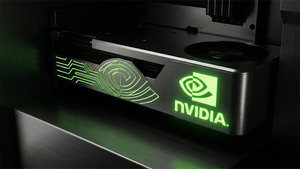
November 14, 2025 – Quantum computing pioneer IonQ (NYSE: IONQ) recently captured significant market attention, with its stock experiencing a notable 3.6% gain on November 5, 2025, driven by an impressive upward revision of its revenue forecasts. This positive momentum was further underscored by a key insider purchase just days later, signaling a vote of confidence from within the company. However, the journey for IonQ, like the broader quantum computing sector, remains characterized by intense innovation, strategic expansion, and considerable financial outlays, resulting in significant net losses and inherent stock volatility.
The immediate implications of these events paint a complex but compelling picture. The stock's initial surge reflected strong investor optimism regarding IonQ's accelerating commercial traction and technological leadership. The subsequent insider buying by a company director on November 11, 2025, further bolstered this sentiment, suggesting internal belief in the company's long-term prospects, even as the stock has seen broader market fluctuations in the weeks surrounding these announcements.
IonQ's Quantum Leap: Revenue Surges, Milestones Achieved, and Strategic Acquisitions
IonQ's recent performance is a testament to its aggressive push in the nascent quantum computing market. On Wednesday, November 5, 2025, the company's shares climbed over 3% in extended trading following its third-quarter 2025 financial results. IonQ reported a robust $39.9 million in revenue for Q3 2025, marking a staggering 222% year-over-year increase and surpassing its own guidance by an impressive 37%. This strong showing prompted the company to raise its full-year 2025 revenue outlook to a range of $106 million to $110 million, significantly exceeding previous estimates and reinforcing its position as a commercial frontrunner.
Beyond financial metrics, IonQ has achieved critical technical milestones. In late September 2025, the company announced it had reached an algorithmic qubit (#AQ) score of 64 on its IonQ Tempo system, three months ahead of schedule. This achievement dramatically expands the computational space available for complex quantum algorithms, claiming to be 36 quadrillion times larger than leading commercial superconducting systems. Furthermore, in October 2025, IonQ announced a world-record 99.99% two-qubit gate fidelity, becoming the first quantum computing company to cross the "four-nines" benchmark. This breakthrough, utilizing proprietary Electronic Qubit Control (EQC) technology, is a crucial step toward fault-tolerant quantum computing by significantly reducing error correction requirements.
The company's strategic expansion is also evident in its aggressive mergers and acquisitions strategy. In 2025 alone, IonQ acquired Oxford Ionics for approximately $1.08 billion, integrating its advanced trapped-ion technology. It also took a controlling stake in ID Quantique (quantum-safe cryptography and sensing), acquired Lightsynq Technologies (photonic interconnects and quantum memory), Vector Atomic (quantum sensing), and Capella Space (space-based Quantum Key Distribution - QKD networks). Most recently, in November 2025, IonQ confirmed plans to acquire Skyloom Global, specializing in optical communications systems for space-based quantum networks, aiming to build a global QKD platform. These acquisitions are designed to build a comprehensive "full-stack" quantum ecosystem across computing, networking, and sensing.
However, this rapid growth and expansion come with a significant financial cost. Despite strong revenue, IonQ reported a substantial GAAP net loss of $1.1 billion for Q3 2025, primarily due to heavy investments in R&D and strategic initiatives. This follows a full-year 2024 net loss of $331.6 million. The stock has also experienced considerable volatility; while the 3.6% gain was notable, the stock fell 10.4% on November 7, 2025, after the company reported a substantial net loss, overshadowing its revenue beat. As of November 14, 2025, IonQ's stock has fallen by 20.74% over the previous week and 43.14% over the last month, though it has seen a 69.89% increase over the past year. The insider purchase on November 11, 2025, by Director William J. Teuber Jr., who acquired 2,000 shares at $54.815 per share, totaling $109,630, stands out against a backdrop of more widespread insider selling by other executives over the past six months, indicating a mixed, yet intriguing, internal sentiment.
Competitive Landscape: IonQ's Position Among Quantum Innovators
IonQ's recent developments have significant implications for itself and its competitors in the fiercely competitive quantum computing market. As a pure-play quantum computing company utilizing a trapped-ion architecture, IonQ (NYSE: IONQ) positions itself against both well-funded tech giants and other specialized quantum firms.
IonQ as a Potential "Winner": Despite its substantial net losses and stock volatility, IonQ is strongly positioned to "win" in the long term if its technological leadership and aggressive commercialization strategy translate into sustained market advantage. Its #AQ 64 and 99.99% two-qubit gate fidelity milestones are direct challenges to competitors, showcasing superior performance in key metrics. The company's "full-stack" strategy, encompassing computing, networking, and sensing through strategic acquisitions, aims to create a comprehensive quantum ecosystem, differentiating it from many rivals. Companies partnering with IonQ, such as cloud providers like Amazon Web Services (NASDAQ: AMZN), Microsoft Azure (NASDAQ: MSFT), and Google Cloud Platform (NASDAQ: GOOGL), benefit by offering cutting-edge quantum capabilities to their enterprise clients. Early adopters like AstraZeneca (NASDAQ: AZN) and Ansys (now owned by Synopsys (NASDAQ: SNPS)) are already seeing tangible benefits, such as accelerated drug discovery and improved engineering simulations.
Companies Facing Pressure ("Losers" or Those Needing to Adapt): Direct competitors, particularly those lagging in technical milestones or relying on less scalable or more error-prone quantum modalities, could face increased pressure. While giants like International Business Machines (NYSE: IBM) and Alphabet (NASDAQ: GOOGL) are heavily invested in superconducting qubits, IonQ's trapped-ion technology claims superior fidelity and a larger computational space in certain benchmarks. Other pure-play quantum companies like Rigetti Computing (NASDAQ: RGTI), which reported significantly lower Q3 revenue compared to IonQ, might see a widening gap in commercial traction. Even within the trapped-ion space, IonQ's 99.99% gate fidelity slightly surpasses Quantinuum's reported 99.92% for its Helios processor, intensifying competition. Companies heavily invested in modalities that prove less viable, or those slow to integrate quantum capabilities, risk falling behind in industries poised for quantum disruption.
Wider Significance: Quantum Computing at an Inflection Point
IonQ's advancements are not isolated; they signify a broader inflection point for the quantum computing industry as a whole. As of 2025, the sector is transitioning from purely theoretical research to tangible commercial applications, driven by increasing investment and the pursuit of "quantum advantage" – where quantum computers outperform classical ones for specific, complex problems.
Industry Trends: IonQ's #AQ 64 milestone directly addresses the industry's focus on practical advantage, demonstrating capabilities for complex applications. Its 99.99% gate fidelity is a critical step towards achieving fault-tolerant quantum computing, a holy grail for the industry, by significantly improving error correction. The company's aggressive acquisition strategy in quantum networking and sensing aligns with the growing trend of developing secure quantum communication networks and specialized quantum sensors. This full-stack approach suggests a move towards integrated quantum solutions rather than standalone hardware.
Ripple Effects: IonQ's technical leads put pressure on competitors, including major tech players, to accelerate their own roadmaps. This could spur further consolidation in the quantum market as larger entities acquire specialized startups to gain technological edges. The validation of the trapped-ion approach by IonQ's successes may also encourage more investment and research in this specific modality, while compelling other approaches to prove their scalability and error correction capabilities.
Regulatory and Policy Implications: The rapid progress in quantum computing has significant national security implications, leading governments worldwide to prioritize export controls on sensitive quantum technologies. The potential for quantum computers to break current encryption methods is driving an urgent need for post-quantum cryptography (PQC) standards and policies, an area IonQ is actively addressing through its quantum networking ventures. Governments are also increasing funding for quantum information science, recognizing its strategic importance, as seen in IonQ's partnerships with entities like the U.S. Department of Energy.
Historical Precedents: The quantum computing journey mirrors the early stages of other transformative technologies like the internet, personal computing, or the semiconductor industry. These fields were also characterized by high R&D costs, speculative investment, and a long path to widespread commercialization. The current high valuations relative to revenue, such as IonQ's price-to-sales ratio, are typical of disruptive technologies where the market anticipates massive future value, similar to the dot-com era or early biotechnology booms.
What Comes Next: Navigating the Quantum Future
The path ahead for IonQ (NYSE: IONQ) and the broader quantum computing market promises continued innovation and significant challenges. In the short term (next 1-2 years), IonQ is poised for sustained revenue growth, driven by its advanced hardware and expanding customer base through cloud partnerships. The successful integration of its recent acquisitions, such as Oxford Ionics and Vector Atomic, will be crucial for realizing cost synergies and delivering a truly "full-stack" quantum solution. We can expect IonQ's #AQ 64 system to deliver more tangible commercial advantages in specific applications like drug discovery and logistics, leading to increased customer adoption. However, stock volatility will likely persist, influenced by earnings, technical breakthroughs, and competitor announcements.
In the long term (3-5+ years), IonQ's ambitious roadmap, targeting 80,000 logical qubits by 2030, aims for fault-tolerant quantum computing, which would unlock a much wider range of complex problems. The company's strategic acquisitions are designed to solidify its leadership in an integrated stack of quantum compute, networking, sensing, and security. By 2030, IonQ's CEO believes the company could achieve profitability with sales near $1 billion, potentially disrupting industries from finance to materials science.
Potential Strategic Pivots: As hardware matures, IonQ might place a greater emphasis on developing quantum software and algorithms. Seamless integration with classical high-performance computing (HPC) systems through hybrid solutions will also be crucial. Should direct commercialization face unexpected hurdles, intellectual property (IP) licensing could become a viable strategy. Furthermore, strengthening ties with government and defense agencies for secure communications and navigation applications, leveraging its quantum sensing and QKD advancements, could be a significant adaptation.
Emerging Opportunities and Challenges: The expansion of Quantum-as-a-Service (QaaS) will continue to democratize access to quantum computing. The development of secure quantum communication networks and ultimately a "quantum internet" presents a massive long-term opportunity, which IonQ is actively pursuing. However, significant challenges remain, including high error rates and the fragility of qubits, scalability issues, a talent shortage, and the need for industry-wide standardization. Managing investor expectations and avoiding a "quantum bubble" will also be critical as the industry navigates the gap between current capabilities and future promise.
Comprehensive Wrap-up: A Glimpse into the Quantum Age
IonQ's (NYSE: IONQ) recent performance underscores its position at the forefront of quantum computing innovation. Its remarkable revenue growth, coupled with groundbreaking technical milestones like #AQ 64 and world-record two-qubit gate fidelity, paints a picture of a company aggressively pursuing the commercialization of quantum technology. The strategic acquisitions further solidify its vision of a comprehensive "full-stack" quantum ecosystem encompassing computing, networking, and sensing.
However, the journey is not without its significant hurdles. The substantial net losses reflect the immense investment required in a nascent, high-risk, high-reward industry. The stock's volatility is a clear indicator of the speculative nature of early-stage disruptive technologies, where future potential often outweighs current profitability.
Assessing the Market Moving Forward: The quantum computing market is undeniably at an inflection point, poised for exponential growth from an estimated $1.6 billion in 2025 to potentially over $7 billion by 2030. This growth will be fueled by the increasing realization of practical quantum applications across cybersecurity, healthcare, finance, and logistics. IonQ's leadership in trapped-ion technology and its full-stack strategy position it as a formidable contender in this expanding market.
Final Thoughts on Significance and Lasting Impact: IonQ's consistent execution on its technological roadmap and its bold strategic moves suggest a determination to move quantum computing from a theoretical endeavor to a commercially viable and transformative technology. Its advancements are not just about faster computation; they represent a fundamental shift in how humanity can solve some of its most complex problems, with potential lasting impacts across scientific discovery, economic efficiency, and national security.
What Investors Should Watch For in Coming Months: Investors should closely monitor IonQ's continued revenue growth and, crucially, its progress toward narrowing its significant net losses. The successful integration of its recent, substantial acquisitions will be vital for realizing synergistic benefits and accelerating its roadmap. Continued execution on its ambitious technical roadmap, particularly regarding qubit scaling and error correction, will be key to maintaining its competitive edge. Furthermore, evidence of growing commercial adoption and tangible real-world applications will be critical. Given IonQ's high valuation metrics and historical volatility, investors should be prepared for continued price swings and maintain a long-term perspective, balancing the immense potential against the inherent risks of a pioneering industry.
This content is intended for informational purposes only and is not financial advice.





